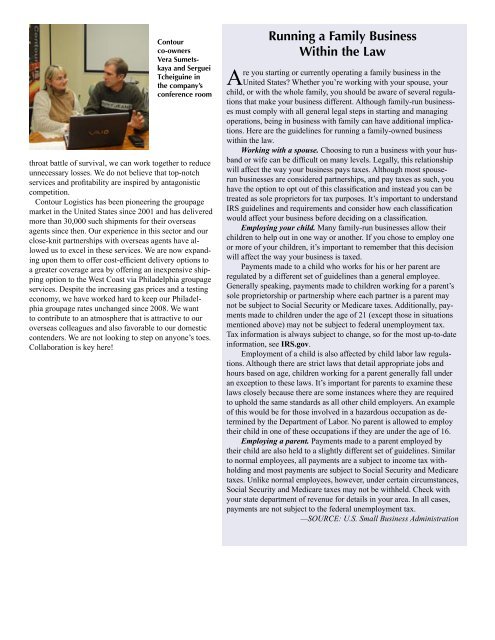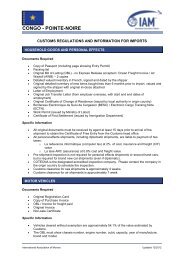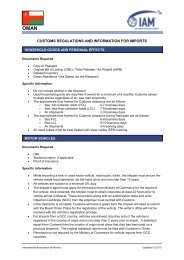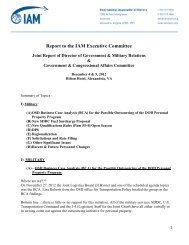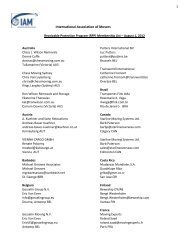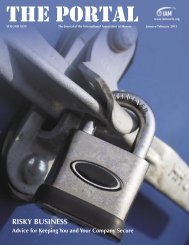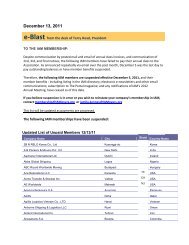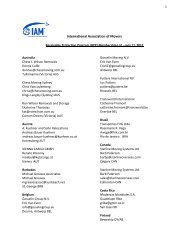Leadership Across Generations: - IAM
Leadership Across Generations: - IAM
Leadership Across Generations: - IAM
Create successful ePaper yourself
Turn your PDF publications into a flip-book with our unique Google optimized e-Paper software.
Contour<br />
co-owners<br />
Vera Sumetskaya<br />
and Serguei<br />
Tcheiguine in<br />
the company’s<br />
conference room<br />
throat battle of survival, we can work together to reduce<br />
unnecessary losses. We do not believe that top-notch<br />
services and profitability are inspired by antagonistic<br />
competition.<br />
Contour Logistics has been pioneering the groupage<br />
market in the United States since 2001 and has delivered<br />
more than 30,000 such shipments for their overseas<br />
agents since then. Our experience in this sector and our<br />
close-knit partnerships with overseas agents have allowed<br />
us to excel in these services. We are now expanding<br />
upon them to offer cost-efficient delivery options to<br />
a greater coverage area by offering an inexpensive shipping<br />
option to the West Coast via Philadelphia groupage<br />
services. Despite the increasing gas prices and a testing<br />
economy, we have worked hard to keep our Philadelphia<br />
groupage rates unchanged since 2008. We want<br />
to contribute to an atmosphere that is attractive to our<br />
overseas colleagues and also favorable to our domestic<br />
contenders. We are not looking to step on anyone’s toes.<br />
Collaboration is key here!<br />
Running a Family Business<br />
Within the Law<br />
A re you starting or currently operating a family business in the<br />
United States? Whether you’re working with your spouse, your<br />
child, or with the whole family, you should be aware of several regulations<br />
that make your business different. Although family-run businesses<br />
must comply with all general legal steps in starting and managing<br />
operations, being in business with family can have additional implications.<br />
Here are the guidelines for running a family-owned business<br />
within the law.<br />
Working with a spouse. Choosing to run a business with your husband<br />
or wife can be difficult on many levels. Legally, this relationship<br />
will affect the way your business pays taxes. Although most spouserun<br />
businesses are considered partnerships, and pay taxes as such, you<br />
have the option to opt out of this classification and instead you can be<br />
treated as sole proprietors for tax purposes. It’s important to understand<br />
IRS guidelines and requirements and consider how each classification<br />
would affect your business before deciding on a classification.<br />
Employing your child. Many family-run businesses allow their<br />
children to help out in one way or another. If you chose to employ one<br />
or more of your children, it’s important to remember that this decision<br />
will affect the way your business is taxed.<br />
Payments made to a child who works for his or her parent are<br />
regulated by a different set of guidelines than a general employee.<br />
Generally speaking, payments made to children working for a parent’s<br />
sole proprietorship or partnership where each partner is a parent may<br />
not be subject to Social Security or Medicare taxes. Additionally, payments<br />
made to children under the age of 21 (except those in situations<br />
mentioned above) may not be subject to federal unemployment tax.<br />
Tax information is always subject to change, so for the most up-to-date<br />
information, see IRS.gov.<br />
Employment of a child is also affected by child labor law regulations.<br />
Although there are strict laws that detail appropriate jobs and<br />
hours based on age, children working for a parent generally fall under<br />
an exception to these laws. It’s important for parents to examine these<br />
laws closely because there are some instances where they are required<br />
to uphold the same standards as all other child employers. An example<br />
of this would be for those involved in a hazardous occupation as determined<br />
by the Department of Labor. No parent is allowed to employ<br />
their child in one of these occupations if they are under the age of 16.<br />
Employing a parent. Payments made to a parent employed by<br />
their child are also held to a slightly different set of guidelines. Similar<br />
to normal employees, all payments are a subject to income tax withholding<br />
and most payments are subject to Social Security and Medicare<br />
taxes. Unlike normal employees, however, under certain circumstances,<br />
Social Security and Medicare taxes may not be withheld. Check with<br />
your state department of revenue for details in your area. In all cases,<br />
payments are not subject to the federal unemployment tax.<br />
—SOURCE: U.S. Small Business Administration


